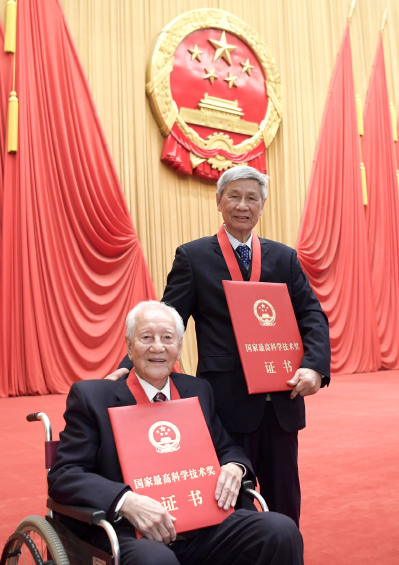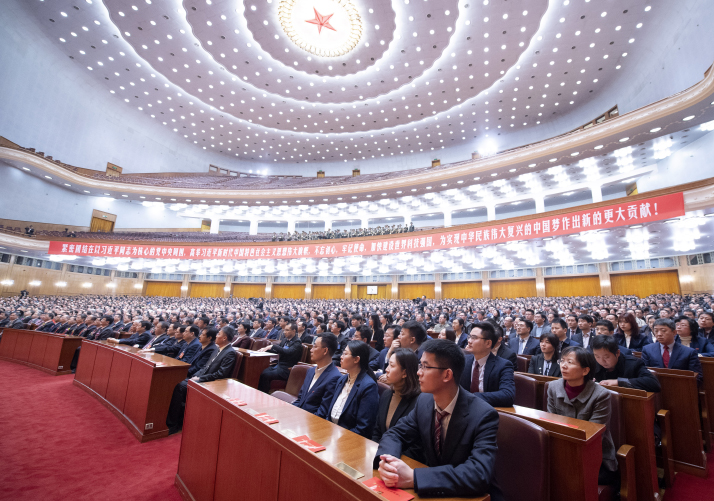|
||||||
|
||||||
| Home Nation World Business Opinion Lifestyle China Focus ChinAfrica Video Multimedia Columnists Documents Special Reports |
|
||||||
|
||||||
| Home Nation World Business Opinion Lifestyle China Focus ChinAfrica Video Multimedia Columnists Documents Special Reports |
| Nation |
| Scientific Peaks |
| National awards highlight the importance of basic and practical research |
| By Wang Hairong · 2020-01-16 · Source: NO.4 JANUARY 23, 2020 |
 Winners of the 2020 top science award Huang Xuhua (left) , the chief designer of China's first-generation nuclear submarines, and Zeng Qingcun, a meteorologist, on January 10 (XINHUA)
For more than two decades, Zhou Qilin, a professor at Nankai University, has kept a rigid and tight work schedule. Six days of the week, he arrives at the laboratory between 7 and 8 a.m., and stays until about 8 p.m., devoting himself to chiral chemistry research. Zhou's persistent work has led to novel findings about highly efficient chiral spiro catalysts, which help to produce chiral compounds such as medicines, pesticides, fragrances and liquid crystals. On January 10, his team was conferred first prize in the State Natural Science Award for their achievements in chiral chemistry at the annual state science and technology awards ceremony honoring distinguished scientists, engineers and research achievements. President Xi Jinping presented the nation's top science award to Huang Xuhua, the chief designer of China's first-generation nuclear submarines, and Zeng Qingcun, a meteorologist. The ceremony honored 296 projects—46 for the State Natural Science Award, 65 for the State Technology Invention Award and 185 for the State Science and Technology Progress Award. In addition, 10 foreign experts won the International Science and Technology Cooperation Award. At the event, Premier Li Keqiang called for furthering the implementation of the innovation-driven development strategy. He highlighted the importance of basic research as the foundation of science and technology innovation and stressed that innovation should address the pressing needs of economic development and people's livelihood. Encouraging basic research Many of this year's award-winning findings were made in basic research in fields including mathematics, Earth science, biology, basic medicine, information science, material science and engineering science. Without a clear understanding of basic science problems, China cannot make original innovations, Zhou said. Lu Zhongyi, a professor at Renmin University of China, and his team won second prize in the State Natural Science Award for theoretical research on the interactions between the electronic structure and magnesium of iron-based superconductors. Their achievements have been widely recognized by the international scientific community. Zhang Yongdong, a researcher with the Institute of Computing Technology of the Chinese Academy of Sciences (CAS), was another winner of second prize in the State Natural Science Award. He led a research on high throughput computing theory and method of Internet video streaming. This project has driven new development in visual computing research and provided important theoretical support for the development of Internet information services. A team led by Zhang Yi, a professor at Sichuan University, also won second prize in the State Natural Science Award for their research on key basic theories of artificial neural networks, with a focus on their convergence and periodic oscillation. In recent years, China has attached more importance to basic research and increased investment, said Lu Wei, an official with the Innovation Development Research Department of the Development Research Center of the State Council, adding that progress can also be seen in the increasing number of academic papers published. Nevertheless, the country still lags behind other major economies in terms of investment intensity and funding source diversification, with the Central Government being the main provider of capital, she told Beijing-based Science and Technology Daily. In 2018, basic research spending accounted for 5.5 percent of China's total expenditure on science and technology, according to the National Bureau of Statistics, and for applied research and experimental development, the proportion was 11.1 and 83.3 percent, respectively. But in 2016, they were 12 percent, 20 percent and 68 percent in Japan, 24 percent, 38 percent and 38 percent in France, 17 percent, 20 percent and 63 percent in the U.S., and 17 percent, 43 percent and 40 percent in the UK, according to the 2018 report on China's research and development expenditure. "We urgently need to strengthen basic research to improve China's original innovation ability," Lu said. Encouragingly, in recent years, enterprises such as Huawei, a worldwide leading telecom equipment manufacturer, have invested heavily in this area.  An annual ceremony is held in Beijing on January 10 to honor distinguished scientists, engineers and research achievements (XINHUA)
Meeting practical needs Regarding the pressing needs of the Chinese economy and its people, Li said China will vigorously develop core technologies such as information technology, artificial intelligence and digital technology to spur industrial upgrading. It will also speed up the application of research results and cultivate more new industries and business models. The country will step up research and development that will benefit the people in such fields as the prevention and control of major diseases, environmental management, transportation and agricultural production, according to government sources. Many research outcomes that were honored at the ceremony meet immediate needs in these fields, highlighting their importance. A stem cell treatment for lupus erythematosus, an autoimmune disease, developed by a team led by Sun Lingyun, a doctor at Nanjing Drum Tower Hospital in Jiangsu Province in east China, won the State Technology Invention Award. Study results in new pathogenesis and treatment of depression, and research in cross-species infection of animal influenza viruses in humans also won awards. Breakthroughs in new-energy vehicles and jet turbines and researches producing environmental benefits were honored. Li Jinmin, a researcher with the Institute of Semiconductors, CAS, won first prize in the State Science and Technology Progress Award for developing and commercializing key technology for efficient and long-life semiconductor lighting. The outcomes have been widely applied and are having a remarkable effect on energy conservation and emission reduction. "At present, nearly 50 percent of the traditional light sources in China have been replaced by LED products, saving 280 billion kWh of electricity per year," Li Jinmin told the press. A number of groundbreaking agricultural research achievements were also recognized. A project led by Xiong Benhai, a researcher with the Institute of Animal Sciences under the Chinese Academy of Agricultural Sciences, won second prize in the State Science and Technology Progress Award. The team applied digital technologies to animal husbandry and developed intelligent feeding equipment. They also created a livestock feed database and a livestock electronic identification system. The results have been used in more than 3,700 enterprises across the country, creating accumulated added value of over 100 billion yuan ($14.5 billion), according to the Beijing Municipal Science and Technology Commission. Other agricultural award winners showed achievements in high-yield wheat species, and created disease and pest-resistant cotton varieties. Furthering innovation At the awards ceremony, Premier Li spelled out measures for further spurring innovation-driven development, stating that the government will increase financial support and encourage non-government investment. The government will also motivate enterprises to play a bigger role in science and technology innovation through tax and fee cuts and policies protecting intellectual property rights, he said. Mass entrepreneurship and innovation will be promoted, while cooperation between large and medium-sized enterprises, universities and individual innovators will be encouraged. The premier called for reform of the research funding system and improvement of the evaluation methods for scientific and technological achievements and scientists, emphasizing ability over age or other factors. Researchers will be supported to concentrate on their work without distractions, while their failures should be tolerated, he said. He also stressed that international cooperation in innovation will be expanded and more conveniences will be provided to scientists and foreign companies coming to China for exchanges and development. Copyedited by Rebeca Toledo Comments to wanghairong@bjreview.com |
About Us | Contact Us | Advertise with Us | Subscribe
|
||
| Copyright Beijing Review All rights reserved 京ICP备08005356号 京公网安备110102005860号 |